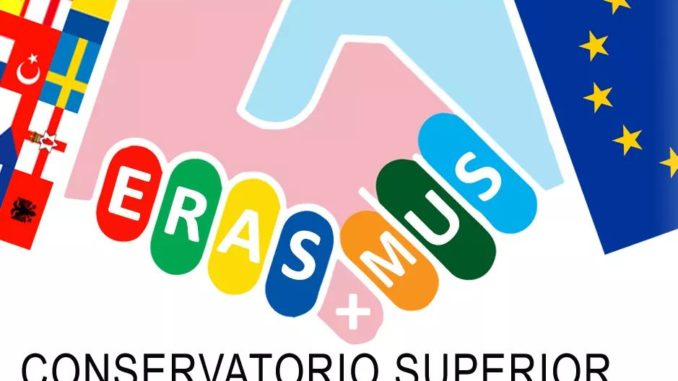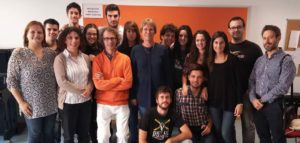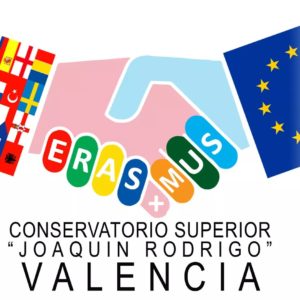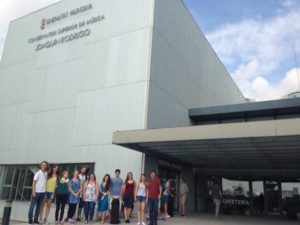
Written by María Moragón Sánchez
From the digital magazine «Notas de Paso» we have contacted Francesc Gaya (the Erasmus coordinator of the CSMV) during this quarantine period, so that he can explain a little bit his work in this department and reveal us the intricacies of the Erasmus mobilities.
Interviewer: Can you tell us briefly what is your task as the CSMV Erasmus coordinator?

Francesc: Basically, I make sure that the individual mobilization of students and teachers can take place, both outgoing (our students to the EU, or OUT students) and incoming (foreigners to the CSMV, or IN students). The amount of work I do is enormous. For instance, there are periods of the year in which I have to keep an eye on three «generations» of our OUT students at the same time: those who have just completed their mobility, those who are already at their destinations, and those who intend to leave in a few months. And the same goes for the IN students who are coming to the CSMV.
Moreover, all these IN-OUT movements (in both directions) must be supported by a previous Agreement, signed with each academic institution (IIA, or Inter-Institutional Agreement). Without an IIA there cannot be movement of any kind. Currently, we have partnerships with 120 academic institutions in 26 countries.

In addition to dealing both with teachers and students, there are many procedures to be carried out with some «organisations», such as the SEPIE (Servicio Español Para la Internacionalización de la Educación), the Ministry of Innovation and Universities of the Generalitat, ISEACV or the AEC (Association Européenne des Conservatoires). We have been associated with the AEC for more than twenty years. This institution is highly committed to the Erasmus Programme, to such an extent that it has promoted the creation of an online platform (called EASY, or European Application System) to facilitate the sending of applications between academic institutions of music in higher education.
And, of course, I must attend our e-mail (erasmus@csmvalencia.es) daily, which is usually bustling with activity, and is the main source of communication between students, teachers, and organizations. Every day I write about 20 or 30 emails, in which I express myself normally in Valencian, Spanish, English or even French.
I: Which relevant aspects, both positive and negative, would you like to highlight from this European programme?
F: Positive aspects? Absolutely all of them! The fact that our students have the chance of carrying out part of their studies in any part of Europe is extremely enriching. But not only for them, but also for our entire educational area, since their experience will somehow return to our conservatory once their mobility is over. Likewise, the arrival of foreign students to the CSMV means a great exchange of experiences.
As far as teacher mobility is concerned, you only need to look at the small «revolution» caused by the visit of around thirty teachers per year, who carry out diverse activities in the CSMV. I never get tired of insisting that their masterclasses are free of charge for our centre: a real luxury that perhaps sometimes we are not aware of.

Every year in September, a meeting takes place between the coordinators of international departments of higher conservatories from all over the EU – it’s great to be able to put a face to the names of the colleagues with whom we have been exchanging emails during the year! Face to face, we find easy solutions to certain problems we may have encountered. At these meetings we are updated on the management of the Programme, but also on many other issues related to internationalisation, examples of good mobilisation, etc.
I: How many IN-OUT students have come to the CSMV during this academic year 2019/2020?
F: This year we have 26 of our students abroad (which constitute 26 OUT-students), and we have welcomed 23 foreigners (23 IN-students). Between incoming and outgoing students there are 49 students in total. Moreover, our IN and OUT students have travelled or come from 15 different countries.
I: With which geographical areas (or conservatories) do you perceive the most exchange or relationship?
F: Of course, Italy is the country with the highest flow of mobility. The transalpine students feel at ease in Valencia (among other reasons) because of the huge similarities between Italian and Spanish (in one month, most of them already speak perfect Spanish).
On the other hand, our students are especially attracted to Central Europe. German «Hochschulen» are in great demand, as some other institutions in Austria, the Netherlands or Belgium. The United Kingdom is also in demand, although to a somewhat lesser extent, mainly because of the high cost of living there and the permanent uncertainty with the Brexit.
In fact, I always recommend our string-students to explore the possibilities of Eastern Europe. In countries like the Czech Republic, Slovakia, Poland, Hungary, or the Baltic Republics, there is a great tradition, with magnificent schools, with the added advantage of a very affordable life standards.
I: How do you feel about the students after their experience in our centre? Which is their assessment about their Erasmus mobility?
F: I can assure you that the general satisfaction level of the IN-students when they finish their stay at the CSMV is pretty high. To begin with, they are especially attracted to our city (Valencia is the second most popular Erasmus destination in Spain after Granada), and beforehand they know very few things about our centre and its teachers. However, they usually leave very happy with the academic quality received, the facilities and support we give them from the International Department, and the familiar treatment they receive from our teachers.
Lately, I have detected that many of the applicants apply for a mobility in our centre with full knowledge of the facts, because their colleagues who did their mobility here before recommended it to them. This informal «word of mouth» shows that our reputation in Europe is growing.
I: How has the current COVID-19 health crisis affected the Erasmus programme?
F: It certainly has affected; a lot, in fact. To begin with, the mobilities planned since March 2020, both incoming and outgoing, have had to be cancelled or postponed.
Of course, it has also affected the exchange students. In-person classes have been suspended in all countries all over Europe, and in some schools, classes are scheduled to resume in mid-May. Fortunately, new technologies allow us to continue with the lessons, and the academic year has not been interrupted; moreover, all mobilities (IN or OUT) still remain «alive». The paradox, then, is that many of our Erasmus students are confined in Valencia, but they are receiving online classes from their destinations. Surely, they did not expect to end their mobility like this!


Dejar una contestacion